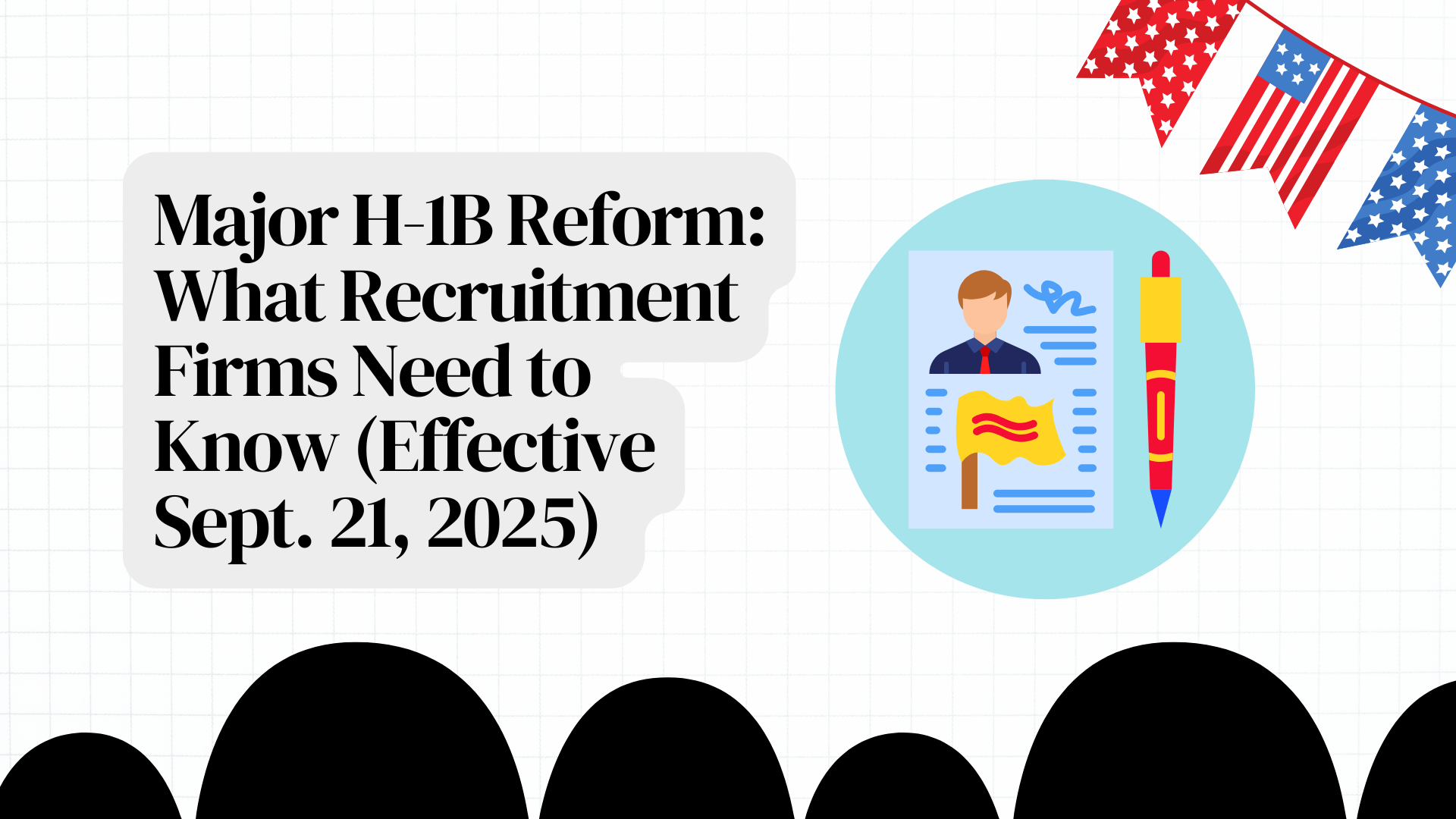On September 19, 2025, the U.S. President signed a Proclamation: “Restriction on Entry of Certain Nonimmigrant Workers” that imposes significant new restrictions on the H-1B visa program. The rule comes into effect at 12:01am EDT on September 21, 2025, and is slated to last for 12 months unless extended.
While the rule is prospective – not affecting existing H-1B holders or petitions filed before the deadline -it can have certain implications for recruitment firms and U.S. employers.
Here are the key provisions:
- Any new H-1B petition filed after the effective time, for a foreign worker outside the U.S., must be accompanied by a $100,000 supplemental payment (on top of the usual fees).
- H-1B petitions for workers outside the U.S. lacking this supplemental fee will likely be denied.
- The rule is prospective: it does not apply to existing H-1B visa holders, or to petitions filed before 12:01am on September 21, 2025.
- Current H-1B visa holders retain their status and are permitted to travel and return (so long as their visa remains valid) without needing to pay the new fee.
- The Administration is also signaling further changes, such as raising prevailing wage levels, and aligning the visa program to favor higher-wage, higher-skilled roles.
- The Proclamation allows for case-by-case exemptions (for instance in the “national interest”) at the discretion of DHS or State Department, though specifics remain vague.
What This Means for Recruitment Firms & Talent Sourcing
These changes could have a material impact on firms that recruit highly skilled talent internationally, especially in industries like tech, biotech, engineering, or any domain with strong dependence on foreign specialists.
Visa expiration awareness & extension planning
Recruiters who currently place contractors holding an H-1B visa need to be aware of these changes. While current contractors will not be affected, recruiters should understand when each candidate’s visa expires and whether the sponsoring employer will obtain a new one. If an end customer wishes to extend a contractor beyond their visa expiration date, recruiters will need to account for these changes.
Much higher cost for new H-1B placements from abroad
Because of the hefty $100,000 supplemental fee, many roles which would previously have been viable for foreign recruitment may no longer be justifiable – especially mid-level roles or ones with tighter margins. Firms may need to limit H-1B sponsorship to only the most critical, high-value roles.
Stricter selectivity & role prioritization
To make the fee “worth it,” employers are likely to become highly selective about which candidates to sponsor. That means pushing for exceptional candidates (higher credentials, more experience, niche specialties) and fewer lower-tier candidates.
Shift in sourcing geography & strategy
Recruiters may start to lean more on:
- Domestic U.S. talent or green card holders / citizens
- Other visa classes or alternative routes (e.g. O-1, L-1, or remote work structures)
- Nearshore / offshore teams rather than relocating individuals to the U.S.
Urgency for current visa holders & travel decisions
Some firms have already advised existing H-1B employees to avoid travel outside the U.S. around the cutover date, to prevent complications or being treated as new applicants. Firms recruiting from abroad or navigating visa stamping should reassess their timelines and remain alert to any further updates from the U.S. Department of Homeland Security.
Budget, pricing, and client expectations
Recruitment firms may need to build in extra buffers or premium pricing for roles that require overseas placement. Clients may push back on the inflated costs. Transparent communication will become more important.
Compliance risk & legal uncertainty
Because this policy is new and arguably aggressive, legal challenges are expected. Firms must stay updated, engage immigration counsel, and treat this as a dynamic risk.
How an EOR Can Help
This is where an Employer of Record (EOR) partner shines. Because the EOR already has U.S. legal and compliance infrastructure, you can:
- Leverage the EOR’s ability to onboard all worker types, both foreign and domestic to widen your candidate pools
- Get agility – hire talent without immediate entity formation concerns
For recruitment firms exploring U.S. expansions or looking to place global talent, now is the time to reassess your visa strategy. If you’d like to explore how our EOR solution navigates or mitigates the new H-1B regime, get in touch – we’re happy to help you stay ahead of the curve.
